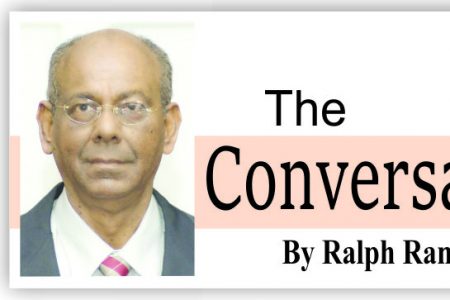
The CCJ’s timidity has intensified the constitutional chaos in Guyana
The Caribbean Court of Justice (CCJ) has extensive powers to make the orders that had been sought in the no-confidence motion cases.
Follow
Profile
Articles by Ralph Ramkarran

The Caribbean Court of Justice (CCJ) has extensive powers to make the orders that had been sought in the no-confidence motion cases.

When Justice Claudette Singh was sworn in, she reminded us that when she was on the bench she was dubbed “The Iron Lady.”
The Chief Justice ruled last week in the case brought by Christopher Ram in connection with the house-to-house registration that it is unlawful to remove names from the registration list during the current exercise merely because they are not present at the addresses or had migrated.
Apart from recognising its “interim” status, the Government acknowledges no other consequence of the no-confidence motion passed in the National Assembly on December 21, after its members challenged the Opposition PPP/C to “bring it on.”

At her swearing in as Chair of Gecom on July 29, 2019, Justice Claudette Singh said that she will follow the law.
Just over a week ago, before President Granger left for Cuba, he pronounced that there would be ‘gridlock’ unless he was given the right to recommend names for inclusion in the list of six persons the Leader of the Opposition would recommend to him from which to choose the Chair of GECOM.

If elections are not held on or before September 18, as appears likely, the Government will fall over a constitutional precipice that it is fast approaching.
The Caribbean Court of Justice (CCJ) has ruled that the Guyana National Assembly “properly passed” a no-confidence motion (NCM) against the Government on December 21.
Grumbles of dissatisfaction were heard from the PPP/C Government when the Caribbean Court of Justice (CCJ) ruled against the Government and in favour of Trinidad Cement Limited (TCL) in 2009.
At the last two hearings of the cases before the CCJ, the clear preference was expressed by the Court for a political resolution of the NCM (no confidence motion) case.
The Caribbean Court of Justice (CCJ) has ruled in two of the most important constitutional cases that have engaged its attention in its ten-year history.
The best quote I have read among dozens in relation to Father’s Day while preparing for this article is this: “By the time a man realises that maybe his father was right, he usually has a son who thinks he’s wrong.”
As the general elections draw near, and the speculation surrounding the choice by the PPP’s of its presidential candidate is over, attention is now focused on the AFC’s choice of its prime ministerial candidate.
The United States renewed its Level 2 travel advisory on Guyana last Thursday.
To the sounds of Buju Banton and the echoes of the Wismar and Sun Chapman massacres, Guyana celebrates its 53rd Independence Anniversary.
The legal adviser to the Elections Commission came in for some blistering, public, abuse by Commissioner Desmond Trotman, who referred to the young lawyer as practising ‘deceit.’
The Caribbean Court of Justice (CCJ) gave a clear indication of its liberal and purposive attitude to constitutional interpretation in the Richardson case last year in which the constitutionality of the two-term presidential limit was challenged.
It is generally accepted that Guyana endured a period of rigged elections between 1968 and 1985.
In English law, fair comment on a matter of public interest is allowed.
Challenges to transparency in Government have attracted public comment in the past two weeks.
The ePaper edition, on the Web & in stores for Android, iPhone & iPad.
Included free with your web subscription. Learn more.